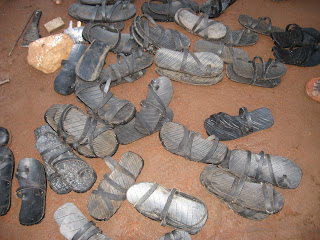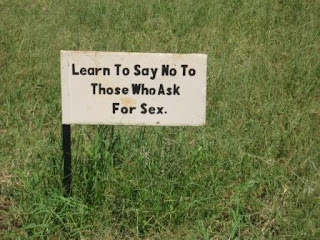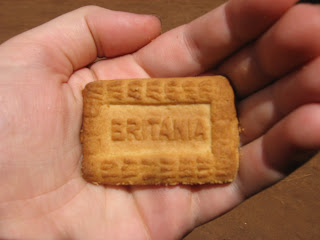Friday, June 29, 2007
Doin' the Tourist Thing in Mombasa for a Week
Friday, June 22, 2007
A Visit to the Thompson Waterfall

Thursday, June 21, 2007
Cow in the Classroom and Some Other Things that are a Little Different in Africa
 This is something a teacher might not say in the United States: "Now children! What have I told you about leaving the classroom door open! The cow will come in here and make a mess if you don't keep the door closed." While we were showing the video at the school in Potika, I saw a cow walk into a classroom. I went over and decided to take a picture. I think the entry of the cow into the classroom was assisted by the open door and the fact that there was no chairs, desks, books, or other teaching materials in the room - just a chalkboard on the wall.
This is something a teacher might not say in the United States: "Now children! What have I told you about leaving the classroom door open! The cow will come in here and make a mess if you don't keep the door closed." While we were showing the video at the school in Potika, I saw a cow walk into a classroom. I went over and decided to take a picture. I think the entry of the cow into the classroom was assisted by the open door and the fact that there was no chairs, desks, books, or other teaching materials in the room - just a chalkboard on the wall. The condom slingshot. Perhaps a little different than the slingshot boys buy from Walmart back in the US.
The condom slingshot. Perhaps a little different than the slingshot boys buy from Walmart back in the US. Ah, the wonderfully repulsive smell of women brewing local alcohol/beer/moonshine. I actually don't know what it is. It looks like used paint thinner and smells much worse. They dry the ingredients by laying them on a piece of fabric or directly on the ground. Perhaps slightly different than buying alcohol at your local dumpy gas station.
Ah, the wonderfully repulsive smell of women brewing local alcohol/beer/moonshine. I actually don't know what it is. It looks like used paint thinner and smells much worse. They dry the ingredients by laying them on a piece of fabric or directly on the ground. Perhaps slightly different than buying alcohol at your local dumpy gas station. Beans anyone? These are World Food Programme beans that were for sale the day after the WFP trucks came and delivered the food. Technically, I think that people can get in trouble for selling their food rations, but I don't blame them. They are not all that amazing.
Beans anyone? These are World Food Programme beans that were for sale the day after the WFP trucks came and delivered the food. Technically, I think that people can get in trouble for selling their food rations, but I don't blame them. They are not all that amazing. Africa's version of "Payless Shoes." And they really are payless shoes. They are made out of old bald tires and apparently one pair can last 20 years (+ or - 5 years). They don't have arch support and they give you bloody blisters for the first few months, but the price is right - less than $2.00 US.
Africa's version of "Payless Shoes." And they really are payless shoes. They are made out of old bald tires and apparently one pair can last 20 years (+ or - 5 years). They don't have arch support and they give you bloody blisters for the first few months, but the price is right - less than $2.00 US.  Dinner. Dried fish with posho/ugali. The big white blob is the cooked corn flour I have talked about in previous posts. The fish is completely bone, skin, fins, and head. However, it was much more appetizing than some other meals we had. Maybe slightly different from the lemon roasted trout you can order and the Red Lobster.
Dinner. Dried fish with posho/ugali. The big white blob is the cooked corn flour I have talked about in previous posts. The fish is completely bone, skin, fins, and head. However, it was much more appetizing than some other meals we had. Maybe slightly different from the lemon roasted trout you can order and the Red Lobster.An Honest Blog
When I left for Potika I was still feeling somewhat ill with typhoid. While I was not feeling the best, I joking told Logan, "If I get sick with a weird tropical disease again I am going home!" The main symptom I had was not feeling hungry. It was a struggle to eat even a few bites at every meal. However, after a few days in Potika and towards the end of my intensive 2 week antibiotic regimen, I started to feel much better. I began to eat normal amounts of food and my headaches were gone. I was still slightly weak and I had a strong suspicion that my immune system had taken a toll during its battle with typhoid. Unfortunately, these suspicions were confirmed when I developed a strange fungal infection on my neck. I think that the fungal infection came from picking up small, hungry, diseased and dirty children in the IDP camp, but there is no way to know for certain. It could also be sleeping on a dirt floor and bathing irregularly.
 Cute Child or Disease Vector?
Cute Child or Disease Vector?
A picture of the neck fungal infection grossness. The central large sore hurt quite a bit. I showed my neck to a health officer in Potika and she said it was a bacterial infection so I put triple antibiotic cream on it for several days under which the sore increased exponentially. Then I showed my neck to a Uganda physician in Kitgum and he said that he didn't know exactly what it was because he wasn't used to looking at white people's skin, but that his best guess was a fungal infection. So I started to use apply an antifungal cream several times a day.
 We Logan and I arrived in Kampala, my neck hadn't really improved much so I went to an 'expensive' private hospital. The doctor that saw me is sitting in the above picture. He thought it was a fungal infection as well and prescribed another antifungal cream. How much was it to see some of the best physicians Uganda has to offer? The physician's consultation was $1.50 and purchasing the fungal cream was $3.00. Perhaps slightly less than it would be in the United States.
We Logan and I arrived in Kampala, my neck hadn't really improved much so I went to an 'expensive' private hospital. The doctor that saw me is sitting in the above picture. He thought it was a fungal infection as well and prescribed another antifungal cream. How much was it to see some of the best physicians Uganda has to offer? The physician's consultation was $1.50 and purchasing the fungal cream was $3.00. Perhaps slightly less than it would be in the United States.  Here is a picture of one of the nuns I am staying with. Her name is Dora and she is actually Guetamala, but she joined the Columbian mission. Everyone here speaks Spanish except for me, but they like to practice their English with me so I don't get left out of the conversations too much. There are 6 other nuns, 5 priests, 2 brothers, and my friend Lucia who I met in Tanzania at the language school. This house is such a restful place. Everyone is really nice and they eat a balanced diet with raw fruits and vegetables and they pray twice a day. Something about staying with a group of people that has dedicated their lives to serving God and the poor is really peaceful. They know I am not a nun and that I am not Catholic, but they seem happy to let me stay here anyway.
Here is a picture of one of the nuns I am staying with. Her name is Dora and she is actually Guetamala, but she joined the Columbian mission. Everyone here speaks Spanish except for me, but they like to practice their English with me so I don't get left out of the conversations too much. There are 6 other nuns, 5 priests, 2 brothers, and my friend Lucia who I met in Tanzania at the language school. This house is such a restful place. Everyone is really nice and they eat a balanced diet with raw fruits and vegetables and they pray twice a day. Something about staying with a group of people that has dedicated their lives to serving God and the poor is really peaceful. They know I am not a nun and that I am not Catholic, but they seem happy to let me stay here anyway.Monday, June 18, 2007
The Craziest Taxi Ride Ever
Logan and I took the 14 hour bus ride from Kampala to Nairobi. I wanted to stay in Nairobi for the Kenya Course I will be taking through the Tulane School of Public Health and Tropical Medicine, but Logan wanted to return to Ethiopia where he manages a home for orphans who are HIV positive. There was a taxi driver named Kevin who helped Logan find a truck that would take him from Nairobi to Ethiopia. The taxi driver met us at the bus station and I asked him to take me to my friend's house (the house where all the Columbian nuns and priests live). So we get in the car and start driving. After about 30 seconds Kevin gets a phone call and answers it. All the way in the passenger seat I can hear a woman yelling at him in Swahili on the other end of the phone. Kevin responds in an equally agitated manner, also in Swahili. I can understand certain phrases such as "simu gani?" ("which phone?") and "mgeni" (he was saying something about driving a guest/visitor). Kevin hangs up on the woman, but she calls again, and again, and again.
Finally the taxi driver hands me the phone and says in English, "This woman wants to talk to you." I was slightly startled, but I took the phone only to find a woman hysterically screaming at me in Swahili. She yelled in one breath, "Jina lako nani? Utafanya nini?!"(What is your name? What are you doing?!") I thought she might not know English so was desperately trying to dig up the Swahili I hadn't used for 2 months and give coherent answers to her inquisition in Swahili. I told her my name in Swahili and that I was a student, but she just wouldn't stop yelling. I recognized the Swahili word that means "husband", but I didn't understand the rest of the sentence.
I was a little bewildered so I gave the phone back to Kevin who talked to the woman for a few minutes and hung up on her again. I asked if the woman was his boss because that was the only person I could think of that would want to talk to the passenger in a taxi. Kevin informed me that the woman was his wife and that his wife thinks he is having an affair with another woman. The he said, "Why did you talk to her in Swahili? I told her that I was driving a white-English speaking woman and now she has heard you speak Swahili, and now she thinks I am lying and that I am not driving anyone but I having an affair." I apologized for increasing his marriage problems and asked what I could do to help. He suggested that we go and pick up his wife to that she could see that I really was a white English speaking person that is not having an affair with him. So, we took a 30 minute detour to pick up a very angry middle-aged Kenyan woman. The woman didn't want to talk to her taxi driver husband so she addressed everything to me. For example she would say, "You can tell that man that [meaning her husband] I called his phone and a strange woman answered!" She did not seem at all impressed at all that Kevin was telling the truth and that I was a white English speaking person that he had never seen before that day or that we had driven half an our out of our way to pick her up. Anyway, I ended up spending the taxi ride acting as a mediator between a husband and wife. I thought it was a pretty funny taxi ride. Oh Africa, the crazy things that happen here!
Friday, June 15, 2007
"Even your soul, it runs away"
Once we were on the subject of LRA abductions, our translator, Alex decided to tell us his abduction story. He said that when he was 15 years old his mother sent him to take some sugar and oil to his grandfather. Alex and his friend were riding their bikes down a dirt road and some drunk rebels with AK-47s came out of the bush and stopped them. The rebels asked Alex and his friend how old they were and Alex tried to lie and said he was 9 hoping that they would think he was too young to be of any use. They said Alex's friend wasn't strong enough so they let him go, but they took Alex.
Alex said the rebels then told him he was part of the Lord's Resistance Army and the gave him (and other abducted children) an induction into the LRA by making a cross with palm tree butter on their foreheads and told them that if they tried to escape they would be cursed and die. They told him he was part of the LRA and that he could never go back to his family. When the LRA abducts young boys from their families, sometimes the force the boy to kill one or more members of his family. Then they tell him, "You are a murderer now and you can never go back to your village. The LRA is the only life you can have now." Fortunately, Alex's family wasn't nearby so he wasn't forced to kill any of them.
After the induction, they started forcing Alex to do hard labor. Namely, carrying very heavy loads. He said they forced him to carry a backpack full of batteries and bullets in addition to 50kg (over 100 pounds) of rice. The LRA rebels told Alex, "We are not your mother don't complain to us about the load being heavy. If you complain we will shot you. Or if you collapse while you are carrying the loads we will shot you." Alex tried to describe the despair he felt when he was struggling to carry the heavy loads, in constant fear of being shot in the head on the whim of a solider, and thinking that he will never see his family again. He said, "You are so sad your heart feels empty and even your soul, it runs away." I think that this probably describes how many children feel after they have abducted by the LRA. The LRA forces the boys to carry heavy loads or become or to fire weapons and they force the girls to be "wives" for the rebels. Perhaps the fate of the girls is worse. They get gang raped every day until they become pregnant and then the LRA rebels shot them. Unless of course, a girl happens to fall into the good graces of Joseph Kony (the leader of the LRA rebels) and then you can join the ranks of his some 600 'wives' and only be raped by him.
Three weeks after he was abducted, Alex was able to escape while the LRA was fighting with the Ugandan Military. The Ugandan Military captured Alex happily took the batteries and bullets from his backpack and then discussed whether or not they should execute him as an LRA rebel for several hours. Finally they decided to let him go and he was reunited with his family.
HIV/AIDS Prevention in the Potika IDP Camp
.JPG) Here the school children (over a 1,000) are watching a film encouraging education for girls. We gave a very simplified talk about HIV afterwards. Unfortunately, I don't have any pictures of us standing in front of the classrooms teaching about HIV because we were busy during the classroom visits and never remembered to take a picture.
Here the school children (over a 1,000) are watching a film encouraging education for girls. We gave a very simplified talk about HIV afterwards. Unfortunately, I don't have any pictures of us standing in front of the classrooms teaching about HIV because we were busy during the classroom visits and never remembered to take a picture..JPG)

Here is one of the many "HIV education signs" posted around the elementary school. Logan commented that this is pretty intense. This is a school for children in grades 1-7 and it has signs like this. It is a different world. Most girls drop out of school before they reach 7th grade because they get married at the age of 13 or 14.
I got to sleep in a mud hut! I got to sleep in a mud hut! I got to sleep in a mud hut!
Here are more pictures of Potika camp A than you probably wanted to see:
.JPG) I will say it once again: "Africa is Beautiful!" I took this picture one afternoon when I had nothing else to do. It looked like this almost every day. This is the southern side of Potika Camp A. If you continue down the road the children are running on you will reach Potika Camp B (a little over a mile away).
I will say it once again: "Africa is Beautiful!" I took this picture one afternoon when I had nothing else to do. It looked like this almost every day. This is the southern side of Potika Camp A. If you continue down the road the children are running on you will reach Potika Camp B (a little over a mile away)..JPG)
.JPG)
.JPG)
I called this hut the "fixer upper hut." I remember when my mom first showed me the house our family now owns in WA state. It was a terrible mess. It had a broken window, a skylight that leaked, random wires sticking out of the walls, a hole next to the bathroom sink, a rotting green house, a pot with 2 year old oat meal sitting on the stove, several different colors of paint on the outside of the house, and a yard filled with old cars and 5 foot high weeds. (They told us that everyone else who looked at the house was considering just knocking the house down and building again on the same property). My mom said, "Isn't it beautiful! This is my dream house! It is so perfect. It is cloudy and raining today so you can't see the view, but it has a really nice view." I thought to myself, "This is the worst fixer upper dump I have ever seen in my whole life." Well, now I can't say that anymore. The above picture shows my new standard for the worst fixer dumb I have seen in my whole life. Sorry mom, I was wrong it was possible to do worse.
.JPG) This was our hut! It was really nice. It was big and had a floor with newly applied black dirt. (For some reason the black dirt is considered 'cleaner' than the normal red/brown dirt).
This was our hut! It was really nice. It was big and had a floor with newly applied black dirt. (For some reason the black dirt is considered 'cleaner' than the normal red/brown dirt). .JPG)
.JPG)
.JPG)
This was one of our neighboring huts. I really liked the door made out of flattened USA cooking oil cans given to the camp inhabitants by the World Food Programme.
Thursday, June 14, 2007
How to make a Ugandan "Traditional Dish"
Another dish we were served was, "Green Vegetable and Fish." This is a fairly simple dish and I think that it would be quite easy to make back in the States. So here are the directions:
1) Buy okra leaves OR
Buy the stalks of spinach OR
Mow the lawn and save the grass clippings
2) Buy cans of sardines OR
Go to your local polluted, dirty and over-fished lake and catch some small fish
3) Lay out the sardines or the small fish from the dirty lake to dry in the sun. It is VERY important that they be placed on dirty surface and be easily accessible to flies. The more flies the better. Leave the fish out to dry for at least 3 days until they look like this:
.JPG) This is a picture to assist in the making of the above listed recipe. (I tried to be very Betty Crockerish and give you a fully illustrated recipe, but unfortunately I don't have the picture of the final product. Hopefully, you can get there without all the pictures).
This is a picture to assist in the making of the above listed recipe. (I tried to be very Betty Crockerish and give you a fully illustrated recipe, but unfortunately I don't have the picture of the final product. Hopefully, you can get there without all the pictures).4) Use a dirty knife to chop the dried sardines or the small fish.
5) Boil water and add the okra/spinach leaves and/or the grass clippings.
6) Add the chopped sardines or fish
7) Cook for several hours, stirring occasionally.
8) Check to make sure the consistency is correct. It should be very slimy. If you use a spoon or a fork to lift some of the grass-mino creation out of the pot, there should be at least 5 inches of slim hanging off the bottom of the spoon. If there is not enough slim, hire a small child to spit saliva into the pot until the dish reaches the correct consistency.
9) Serve to your guests with a ball of posho (tasteless cooked corn flour). If you don't have any corn flour on hand, just make some Cream of Wheat and add to much powder to the water so that it gets really hard and dry.
10) Carefully watchyour guests eat, making sure that they finish their entire serving.
We were served this "Green Vegetable with Fish" while we were in Potika and unfortunately, I don't have a picture of it, because we were being watched by the cook and I didn't want to make her feel bad by taking a picture of the food-grossness.
Tuesday, June 12, 2007
Six Middle-Aged Men Playing Uno at 10am on a Thursday Morning
.JPG) Alex looks on as a serious game of Uno takes place. They actually keep score and bet on the Uno game. However, they call the game "last card" instead of "Uno".
Alex looks on as a serious game of Uno takes place. They actually keep score and bet on the Uno game. However, they call the game "last card" instead of "Uno"..JPG)
.JPG)
Monday, June 11, 2007
A Birthday in Africa!
 Birthday sodas! I am sorry this picture is slightly blurry. It was taken by a slightly drunk man who had very little previous experience with a camera.
Birthday sodas! I am sorry this picture is slightly blurry. It was taken by a slightly drunk man who had very little previous experience with a camera..JPG)
.JPG)
.JPG)




